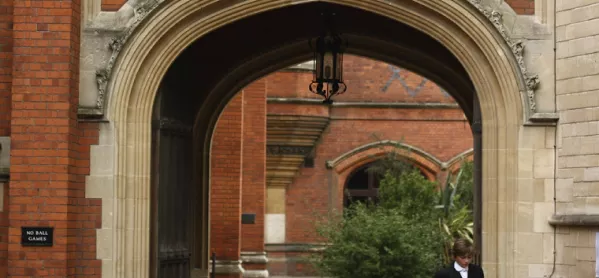Exclusive: Charitable status ‘more trouble than it’s worth’ say independent schools
Share
Exclusive: Charitable status ‘more trouble than it’s worth’ say independent schools
Just five years ago, private schools spent large amounts of time and money defending their right to charitable status in a protracted, but largely successful, legal dispute with the Charity Commission.
But today, TES can reveal, parts of the sector are having a rethink, with growing numbers of fee-paying schools starting to ask whether being a charity is more trouble than it is worth.
There are suggestions that some would abandon the status altogether if the government made it easier for them to do so.
“Many schools think to themselves from time to time that the relatively meagre benefits of charitable status hardly seem worth having, given the amount of pressure they come under and the additional requirements that are made on them,” Barnaby Lenon, chair of the Independent Schools Council (ISC) - which represents 1,267 schools, of which around 1,000 are charities - told TES.
“Having said that, I’m not aware of any schools that have actually taken a decision to abandon charitable status because they just don’t think it’s worth having,” the former head master of Harrow School added.
“There are a number of reasons for that. One is that it’s not straightforward legally…If it were made easier to abandon charitable status, then more schools would.”
In March, Ofsted’s chief inspector Sir Michael Wilshaw said that private schools should lose their charitable tax breaks unless they volunteered to run state academies.
“There’s a huge exaggeration of the benefits for us of being charities,” said Bernard Trafford, headmaster of the independent Newcastle upon Tyne Royal Grammar School.
“We want to be charities because we still believe passionately that education is a charitable purpose, so we stay with it. But it’s not worth such great riches to us that it would be something we’d feel that we want to be held to ransom over.”
He said his school would be “slightly worse off” if it lost charitable status, which brings tax breaks. The move would cost it about two or three per cent of its annual turnover, he said. Ceasing to be a charity “is not the thing we’d choose to do, but if there was too much political pressure maybe we’d have to get them off our backs in a way”, he added.
Some argue that schools’ frustration about political interference is a sign that charitable status isn’t right for them.
Martin Stephen, former high master of the London public school St Paul’s School, said: “I think that the charities model is obsolete and outdated.
“Charitable status makes you vulnerable; you’re at the behest of government legislation and other people deciding what charity is. In my view the way forward for fee-paying education is as a non-profit-making business.”
This is an edited article from the 24 June edition of TES. Subscribers can read the full article here. This week’s TES magazine is available in all good newsagents. To download the digital edition, Android users can click here and iOS users can click here
Want to keep up with the latest education news and opinion? Follow TES on Twitter and like TES on Facebook




